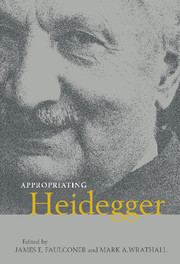Book contents
- Frontmatter
- Contents
- List of contributors
- Acknowledgments
- 1 Appropriating Heidegger
- PART 1 THINKING OUR AGE
- PART 2 HEIDEGGER IN CONTEXT
- PART 3 READING BEING AND TIME
- 9 In respectful contempt: Heidegger, appropriation, facticity
- 10 Could anything be more intelligible than everyday intelligibility? Reinterpreting division I of Being and Time in the light of division II
- 11 Another time
- 12 Intentionality, teleology, and normativity
- Index
12 - Intentionality, teleology, and normativity
Published online by Cambridge University Press: 22 September 2009
- Frontmatter
- Contents
- List of contributors
- Acknowledgments
- 1 Appropriating Heidegger
- PART 1 THINKING OUR AGE
- PART 2 HEIDEGGER IN CONTEXT
- PART 3 READING BEING AND TIME
- 9 In respectful contempt: Heidegger, appropriation, facticity
- 10 Could anything be more intelligible than everyday intelligibility? Reinterpreting division I of Being and Time in the light of division II
- 11 Another time
- 12 Intentionality, teleology, and normativity
- Index
Summary
According to Heidegger, all human activity involves a double teleology. One acts in order to accomplish some end, but one also acts for the sake of being a certain sort of person. Engaging in an act of philosophical interpretation is a paradigmatically human activity. So if Heidegger is right regarding human action (and I believe that he is), any act of interpreting a philosopher's work must not only be an act that is performed in order to achieve some goal, but also an act in and through which the interpreter acts for the sake of realizing some possibility of human existence.
I have spent a substantial portion of my life attempting to interpret the work of Martin Heidegger. This activity has had, in general, the goal of my coming to understand his work. But human activities rarely have such general goals. Rather, one acts in order to accomplish something in particular. In the case of acts of interpretation such particularity is usually achieved by the interpreter approaching the texts to be interpreted with a leading question in hand, a question that specifies what is to be found out in the interpreting. And for my interpretation of Heidegger this leading question has been specified by my understanding of what it is to be a philosopher.
- Type
- Chapter
- Information
- Appropriating Heidegger , pp. 191 - 206Publisher: Cambridge University PressPrint publication year: 2000
- 1
- Cited by



